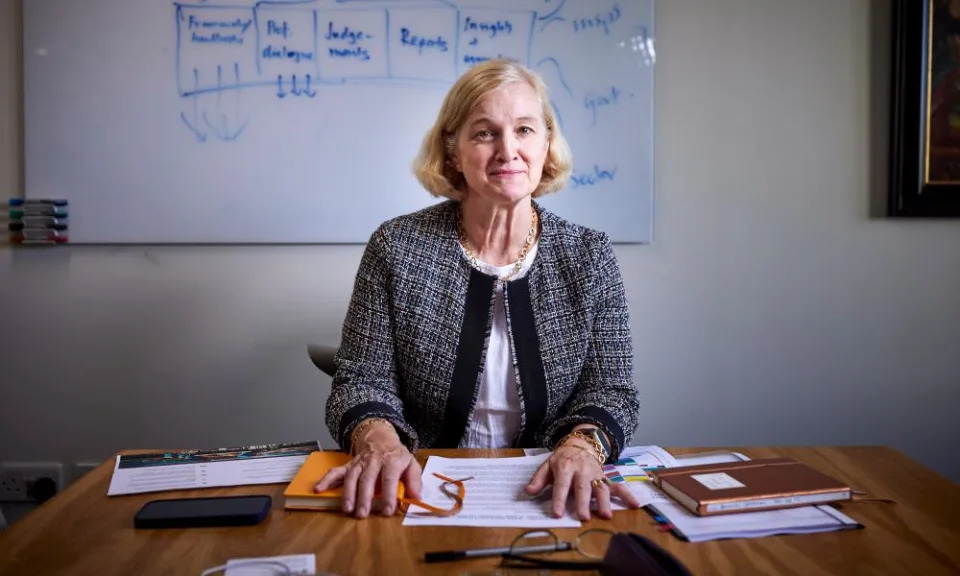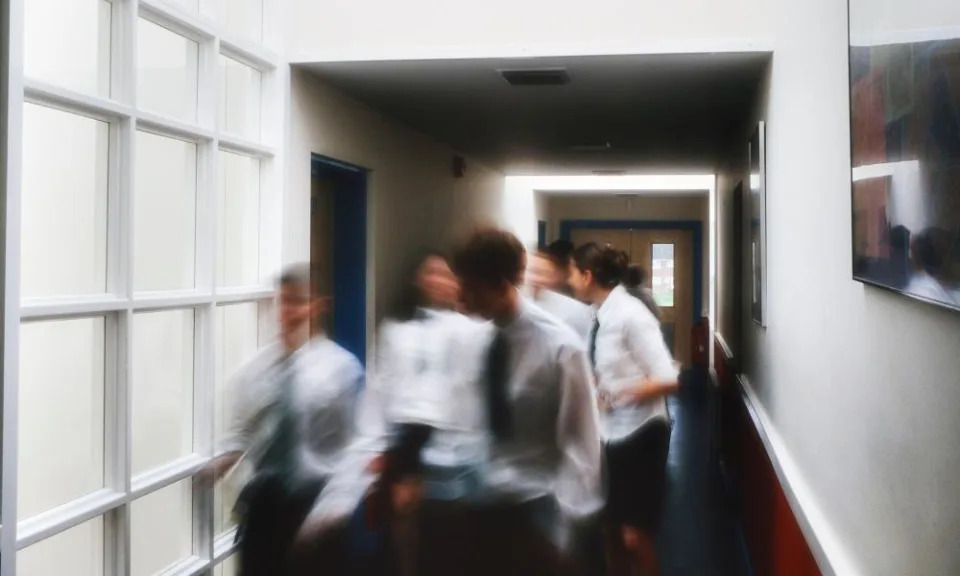Disruptive behaviour in English schools worse since Covid, says outgoing Ofsted head
Sally Weale Education correspondent
Thu, 5 October 2023

Photograph: David Levene/The Guardian
Behaviour in schools in England has deteriorated since the pandemic, with pupils refusing to comply with rules, talking back to teachers and walking out of class mid-lesson, the head of Ofsted says.
Suspensions for physical assault, threatening behaviour and verbal abuse have increased, with even primary schoolchildren being defiant and refusing to follow simple classroom instructions, such as to get out their books.
In some cases, children are turning up at school for registration but, despite being on the premises, failing to attend any lessons, the outgoing chief inspector of schools in England, Amanda Spielman, said in an exclusive interview with the Guardian.
Poor behaviour and disruption in the classroom were contributing to anxiety and poor mental health among some pupils, she said, which was, in turn, adding to high levels of absence in English schools.
More than two out of five teachers (42%) who took part in a recent Ofsted survey on pupil behaviour said it had worsened since the pandemic. Initial findings from new Ofsted research, due to be published next year, show the three most frequent behaviour issues are persistent low-level disruption, cited by more than two-thirds of staff (67%), refusal behaviour or passive non-compliance, where a child ignores an authority figure (67%), and talking back at teaching staff (64%).
“This is across the system,” said Spielman. “There’s definitely some real challenges for schools to manage at the moment. Schools are having to deal with things like more children just walking out of classes, or being registered at school but failing to show up in lessons.”
Spielman will address some of these issues in a speech to the Confederation of School Trusts on Friday, when she is expected to say: “I know how hard it is for many of you to deal with challenging behaviour at the moment. But poor behaviour can make other children anxious about school.
“Clear rules and expectations, consistently applied, and with known consequences for breaking them, are, of course, an important element of a proven approach. But it’s not enough just to set the rules and sit back. Children need to be taught behaviour and routines explicitly, and be given time to learn and practise meeting those expectations.”

More than two out of five teachers (42%) who took part in a recent Ofsted survey said behaviour had worsened since the pandemic. Photograph: parkerphotography/Alamy
The government’s own figures show the number of temporary suspensions went up to more than half a million (578,280) in 2021-2 – the latest year for which figures are available, an increase from 352,454 in 2020-21 – when schools were severely disrupted by Covid – and 438,300 in 2018-19, before the pandemic. The most common reason for a temporary suspension was persistent disruptive behaviour.
Spielman blames the increase in disruptive behaviour on the loss of socialisation as a result of Covid. “A lot of people have had a lot less of that socialisation. Many young people have not had as much of the experience and opportunity to practise as they normally would have done.”
The chief inspector was speaking shortly after the education secretary, Gillian Keegan, addressing the Conservative party conference, announced new guidance to ban mobile phones throughout the school day in an effort to reduce distraction, disruptive behaviour and bullying.
Spielman said the ban could help with behaviour issues but was not “a magic bullet”, adding that the damage done by Covid lockdowns would take years to repair. “I don’t want to be over-optimistic, nor do I want to be apocalyptic. I just want to acknowledge this is a multi-year challenge.”
In a wide-ranging interview, Spielman also rejected criticism of Ofsted, especially over the death of the Berkshire primary headteacher’s Ruth Perry, saying the inspectorate was merely carrying out government policy and if people wanted a different Ofsted, it was up to the government to change it.
Perry’s death is the subject of an inquest hearing next month, but her family have said she killed herself after a devastating Ofsted inspection. Spielman said it would be inappropriate to comment, saying only: “I totally understand that it’s been a very difficult time for the family and we have to leave the inquest to do its job.”
Sir Martyn Oliver, chief executive of the Outwood Grange academies trust, has been confirmed as the next chief inspector of schools.
The Department for Education said: “Poor behaviour disrupts lessons and has a profound effect on teachers. We are determined all pupils learn in a calm environment, which is why just this week we have banned mobile phone use in schools.
“This is on top of our ongoing £10m behaviour hubs programme, which is supporting up to 700 schools to improve their behaviour. We are also supporting schools through our recently expanded attendance hubs, mentors programme and by setting up the attendance action alliance of national leaders from education, children’s social care and allied services.”
Poor behaviour and disruption in the classroom were contributing to anxiety and poor mental health among some pupils, she said, which was, in turn, adding to high levels of absence in English schools.
More than two out of five teachers (42%) who took part in a recent Ofsted survey on pupil behaviour said it had worsened since the pandemic. Initial findings from new Ofsted research, due to be published next year, show the three most frequent behaviour issues are persistent low-level disruption, cited by more than two-thirds of staff (67%), refusal behaviour or passive non-compliance, where a child ignores an authority figure (67%), and talking back at teaching staff (64%).
“This is across the system,” said Spielman. “There’s definitely some real challenges for schools to manage at the moment. Schools are having to deal with things like more children just walking out of classes, or being registered at school but failing to show up in lessons.”
Spielman will address some of these issues in a speech to the Confederation of School Trusts on Friday, when she is expected to say: “I know how hard it is for many of you to deal with challenging behaviour at the moment. But poor behaviour can make other children anxious about school.
“Clear rules and expectations, consistently applied, and with known consequences for breaking them, are, of course, an important element of a proven approach. But it’s not enough just to set the rules and sit back. Children need to be taught behaviour and routines explicitly, and be given time to learn and practise meeting those expectations.”

More than two out of five teachers (42%) who took part in a recent Ofsted survey said behaviour had worsened since the pandemic. Photograph: parkerphotography/Alamy
The government’s own figures show the number of temporary suspensions went up to more than half a million (578,280) in 2021-2 – the latest year for which figures are available, an increase from 352,454 in 2020-21 – when schools were severely disrupted by Covid – and 438,300 in 2018-19, before the pandemic. The most common reason for a temporary suspension was persistent disruptive behaviour.
Spielman blames the increase in disruptive behaviour on the loss of socialisation as a result of Covid. “A lot of people have had a lot less of that socialisation. Many young people have not had as much of the experience and opportunity to practise as they normally would have done.”
The chief inspector was speaking shortly after the education secretary, Gillian Keegan, addressing the Conservative party conference, announced new guidance to ban mobile phones throughout the school day in an effort to reduce distraction, disruptive behaviour and bullying.
Spielman said the ban could help with behaviour issues but was not “a magic bullet”, adding that the damage done by Covid lockdowns would take years to repair. “I don’t want to be over-optimistic, nor do I want to be apocalyptic. I just want to acknowledge this is a multi-year challenge.”
The chief inspector, who is due to step down at the end of 2023 after seven years in the job, also called for the government urgently to issue its long-awaited transgender guidance for schools, which Rishi Sunak promised to publish earlier this summer but which has been subject to lengthy delays.
She said the issue was taking up “disproportionate” amounts of school time as headteachers struggled to navigate complicated issues on a case-by-case basis, relying on ad hoc materials from various groups.
“I don’t believe it’s fair or realistic to expect every school to make decisions individually, in the absence of a clear framework,” Spielman said. “It’s something that is taking up disproportionate amounts of school time, at a time when management capacity is absolutely at a premium. So let’s make the job easier for schools by getting that guidance out.”
She said the issue was taking up “disproportionate” amounts of school time as headteachers struggled to navigate complicated issues on a case-by-case basis, relying on ad hoc materials from various groups.
“I don’t believe it’s fair or realistic to expect every school to make decisions individually, in the absence of a clear framework,” Spielman said. “It’s something that is taking up disproportionate amounts of school time, at a time when management capacity is absolutely at a premium. So let’s make the job easier for schools by getting that guidance out.”
In a wide-ranging interview, Spielman also rejected criticism of Ofsted, especially over the death of the Berkshire primary headteacher’s Ruth Perry, saying the inspectorate was merely carrying out government policy and if people wanted a different Ofsted, it was up to the government to change it.
Perry’s death is the subject of an inquest hearing next month, but her family have said she killed herself after a devastating Ofsted inspection. Spielman said it would be inappropriate to comment, saying only: “I totally understand that it’s been a very difficult time for the family and we have to leave the inquest to do its job.”
Sir Martyn Oliver, chief executive of the Outwood Grange academies trust, has been confirmed as the next chief inspector of schools.
The Department for Education said: “Poor behaviour disrupts lessons and has a profound effect on teachers. We are determined all pupils learn in a calm environment, which is why just this week we have banned mobile phone use in schools.
“This is on top of our ongoing £10m behaviour hubs programme, which is supporting up to 700 schools to improve their behaviour. We are also supporting schools through our recently expanded attendance hubs, mentors programme and by setting up the attendance action alliance of national leaders from education, children’s social care and allied services.”


No comments:
Post a Comment